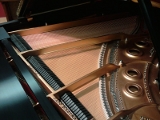
Piano Technician
Servicing pianos in Baltimore and surrounding areas.
Piano Care
Proper care and maintenance of your piano will preserve its quality, and your enjoyment of it, for many decades. It is one of the few investments we make with a view to lifelong possession.
Regular tuning and service will keep your piano in its optimum condition. This will not only enhance your playing pleasure but also prevent unnecessary major expenses in the future, upholding the value of your investment.
Piano Tuning
(Top of Page)
Many people ask how often their piano should be
tuned. The answer to this question will depend on
the way the piano is being used and the
environment in which it is kept .
A piano contains approximately 220 strings that exert up to around 20 tons (or 40,000 pounds) of tension on the plate and frame, as well as around 600 to 1,000 pounds of down-bearing on the bridges and soundboard. Seasonal changes in humidity, as well as the normal continual change in static tension, will cause all pianos to go out of tune.
The humidity fluctuates widely from
season to season in the Mid-Atlantic region. These
humidity changes affect the tuning and response of
your piano. Therefore the majority of piano
manufacturers recommend that pianos be tuned at
least twice each year in this region.
Many teachers and institutions tune
their pianos four or more times each year. Pianos
used on stage in theaters (such as on Broadway in
NY) are tuned at least four times each week. A
concert grand piano on stage or in a recording
studio may be tuned every time it is played, many
times they are also "micro-tuned" during the
intermission.
It is important to keep a piano tuned
to Concert Pitch. This keeps the tensions in the
piano where they were designed to be. The piano
will sound better and you will enjoy playing it
more. This is especially important when children
(and adults) are learning to play. Enjoying the
experience of playing, and learning the correct
way music should sound, are integral parts of a
good musical education.
In addition to tuning your piano, during each service call I will check and adjust the pedals, check and tighten the bench bolts, and inspect your piano for repairs and adjustments that may be needed or recommended.
Piano Repairing
(Top of Page)
Your piano is a mechanical
instrument made up of 9 to 14 thousand parts, most
of which are wood, leather, or felt. Being a
mechanical device, your piano will need repairs
and adjustments from time to time. Leather and
felt parts wear, wooden parts can break, even on
the most expensive pianos.
Regular repair and maintenance will keep your piano in optimum condition, allowing you to play and sound your best on the instrument of your choice.
Piano Regulating & Cleaning
(Top of Page)
As a mechanical device your piano
action (the working, or moving parts inside) needs
regular adjustment. Parts swell and shrink as the
humidity changes, parts wear out with use, or
fatigue with age. Dirt and grit prematurely wear
out felt, leather and wooden parts.
Regulating and cleaning prolongs the
life of your piano. Proper regulation is essential
for the best performance of your piano. A well
regulated piano is a joy to play because it is
more responsive to the demands of the pianist.
Regulating a piano is a separate service from
tuning.
New pianos usually arrive fairly well regulated. However, the new felt and leather parts “break in” and minor regulating is often needed during the first and/or second year of use.
Voicing
(Top of Page)
Voicing is also called “tone
regulating” and is really the final part of
regulating the piano. Although it involves many
aspects, voicing may include adjusting the piano's
hammers to achieve a full, smooth and pleasing
tone in the piano.
Appraisals
(Top of Page)
There are many reasons you may
want a written appraisal of your piano's value.
These include securing a rider on your insurance
policy, insuring it for a move, or before placing
it in storage.
When selling your piano, a written
appraisal will provide a solid basis for setting
your price and negotiating with potential
purchasers. Purchasers may also want an appraisal
to aid in their purchase of a piano.
Those wishing to donate a piano to a
house of worship or other charitable group should
also have an independent appraisal of the value of
the piano.
(Top of Page)
Estimates for repairs or
maintenance can be extremely helpful in making
decisions about your piano.
Insurance claims may require a professional quote or estimate for work required etc. in the event of an insurance claim.
(Top of Page)
I am available to assist you in
purchasing a new or used piano, either from a
store or from a private party. I am not a piano
dealer and generally do not buy and sell pianos.
However, I am able to advise you on a piano you
may be considering purchasing, or help you find
the right piano at a price that fits your needs
and budget, through my many contacts within the
industry.